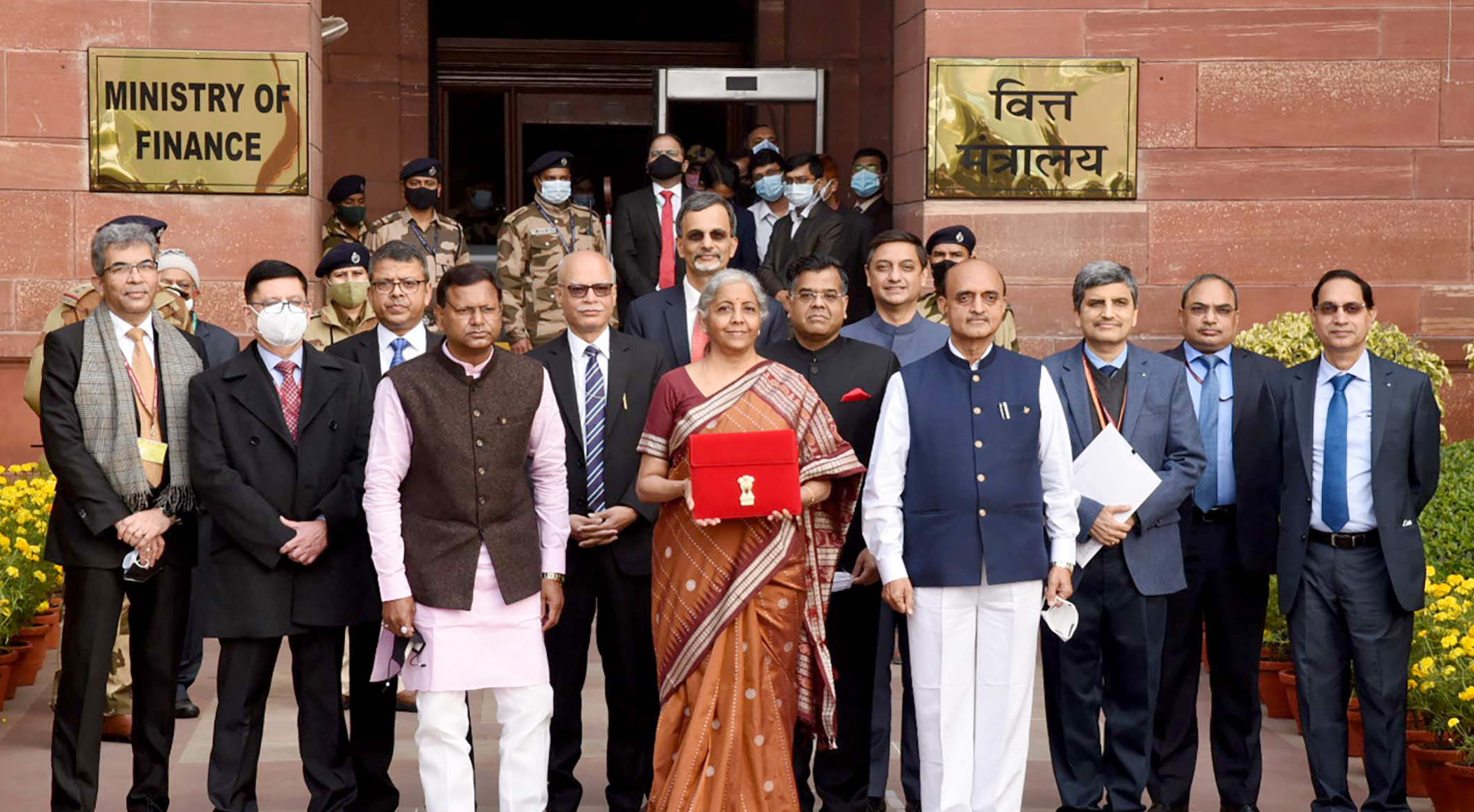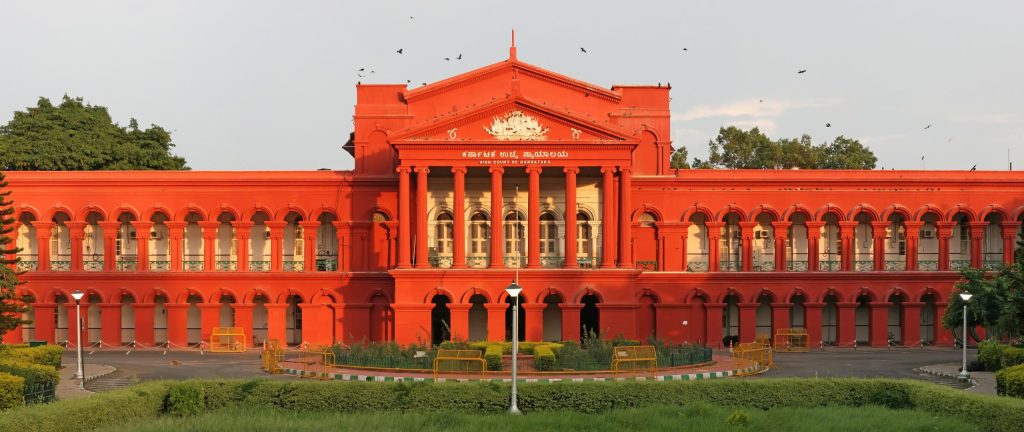Now Reading: Key Highlights of Union Budget 2022-23
-
01
Key Highlights of Union Budget 2022-23

Key Highlights of Union Budget 2022-23
The Union Budget seeks to complement macro-economic level growth with a focus on micro-economic level all inclusive welfare. The Union Minister for Finance & Corporate Affairs, Smt Nirmala Sitharaman tabled the Union Budget 2022-23 in Parliament on 1st Feb’2022.
The key highlights of the budget are as follows:
PART A
- India’s economic growth estimated at 9.2% to be the highest among all large economies.
- 60 lakh new jobs to be created under the productivity linked incentive scheme in 14 sectors.
- PLI Schemes have the potential to create an additional production of Rs 30 lakh crore.
- Entering Amrit Kaal, the 25 year long lead up to India @100, the budget provides impetus for growth along four priorities:
- PM GatiShakti
- Inclusive Development
- Productivity Enhancement & Investment, Sunrise opportunities, Energy Transition, and Climate Action.
- Financing of investments
PM GatiShakti
- The seven engines that drive PM GatiShakti are Roads, Railways, Airports, Ports, Mass Transport, Waterways and Logistics Infrastructure.
PM GatiShkati National Master Plan
- The scope of PM GatiShakti National Master Plan will encompass the seven engines for economic transformation, seamless multimodal connectivity and logistics efficiency.
- The projects pertaining to these 7 engines in the National Infrastructure Pipeline will be aligned with PM GatiShakti framework.
Road Transport
- National Highways Network to be expanded by 25000 Km in 2022-23.
- Rs 20000 Crore to be mobilized for National Highways Network expansion.
Multimodal Logistics Parks
- Contracts to be awarded through PPP mode in 2022-23 for implementation of Multimodal Logistics Parks at four locations.
Railways
- One Station One Product concept to help local businesses & supply chains.
- 2000 Km of railway network to be brought under Kavach, the indigenous world class technology and capacity augmentation in 2022-23.
- 400 new generation Vande Bharat Trains to be manufactured during the next three years.
- 100 PM GatiShakti Cargo terminals for multimodal logistics to be developed during the next three years.
Parvatmala
- National Ropeways Development Program, Parvatmala to be taken up on PPP mode.
- Contracts to be awarded in 2022-23 for 8 ropeway projects of 60 Km length.
Inclusive Development
Agriculture
- Rs. 2.37 lakh crore direct payment to 1.63 crore farmers for procurement of wheat and paddy.
- Chemical free Natural farming to be promoted throughout the county. Initial focus is on farmer’s lands in 5 Km wide corridors along river Ganga.
- NABARD to facilitate fund with blended capital to finance startups for agriculture & rural enterprise.
- ‘Kisan Drones’ for crop assessment, digitization of land records, spraying of insecticides and nutrients.
Ken Betwa project
- 1400 crore outlay for implementation of the Ken – Betwa link project.
- 9.08 lakh hectares of farmers’ lands to receive irrigation benefits by Ken-Betwa link project.
MSME
- Udyam, e-shram, NCS and ASEEM portals to be interlinked.
- 130 lakh MSMEs provided additional credit under Emergency Credit Linked Guarantee Scheme (ECLGS)
- ECLGS to be extended up to March 2023.
- Guarantee cover under ECLGS to be expanded by Rs 50000 Crore to total cover of Rs 5 Lakh Crore.
- Rs 2 lakh Crore additional credit for Micro and Small Enterprises to be facilitated under the Credit Guarantee Trust for Micro and Small Enterprises (CGTMSE).
- Raising and Accelerating MSME performance (RAMP) programme with outlay of Rs 6000 Crore to be rolled out.
Skill Development
- Digital Ecosystem for Skilling and Livelihood (DESH-Stack e-portal) will be launched to empower citizens to skill, reskill or upskill through on-line training.
· Startups will be promoted to facilitate ‘Drone Shakti’ and for Drone-As-A-Service (DrAAS).
Education
- ‘One class-One TV channel’ programme of PM eVIDYA to be expanded to 200 TV channels.
· Virtual labs and skilling e-labs to be set up to promote critical thinking skills and simulated learning environment.
· High-quality e-content will be developed for delivery through Digital Teachers.
· Digital University for world-class quality universal education with personalised learning experience to be established.
Health
- An open platform for National Digital Health Ecosystem to be rolled out.
· ‘National Tele Mental Health Programme’ for quality mental health counselling and care services to be launched.
- A network of 23 tele-mental health centres of excellence will be set up, with NIMHANS being the nodal centre and International Institute of Information Technology-Bangalore (IIITB) providing technology support.
Saksham Anganwadi
- Integrated benefits to women and children through Mission Shakti, Mission Vatsalya, Saksham Anganwadi and Poshan 2.0.
- Two lakh anganwadis to be upgraded to Saksham Anganwadis.
Har Ghar, Nal Se Jal
- Rs. 60,000 crore allocated to cover 3.8 crore households in 2022-23 under Har Ghar, Nal se Jal.
Housing for All
- Rs. 48,000 crore allocated for completion of 80 lakh houses in 2022-23 under PM Awas Yojana.
Prime Minister’s Development Initiative for North-East Region (PM-DevINE)
- New scheme PM-DevINE launched to fund infrastructure and social development projects in the North-East.
- An initial allocation of Rs. 1,500 crore made to enable livelihood activities for youth and women under the scheme.
Vibrant Villages Programme
- Vibrant Villages Programme for development of Border villages with sparse population, limited connectivity and infrastructure on the northern border.
Banking
- 100 per cent of 1.5 lakh post offices to come on the core banking system.
- Scheduled Commercial Banks to set up 75 Digital Banking Units (DBUs) in 75 districts.
e-Passport
- e-Passports with embedded chip and futuristic technology to be rolled out.
Urban Planning
- Modernization of building byelaws, Town Planning Schemes (TPS), and Transit Oriented Development (TOD) will be implemented.
- Battery swapping policy to be brought out for setting up charging stations at scale in urban areas.
Land Records Management
- Unique Land Parcel Identification Number for IT-based management of land records.
Accelerated Corporate Exit
- Centre for Processing Accelerated Corporate Exit (C-PACE) to be established for speedy winding-up of companies.
AVGC Promotion Task Force
- An animation, visual effects, gaming, and comic (AVGC) promotion task force to be set-up to realize the potential of this sector.
Telecom Sector
- Scheme for design-led manufacturing to be launched to build a strong ecosystem for 5G as part of the Production Linked Incentive Scheme.
Export Promotion
- Special Economic Zones Act to be replaced with a new legislation to enable States to become partners in ‘Development of Enterprise and Service Hubs’.
AtmaNirbharta in Defence:
- 68% of capital procurement budget earmarked for domestic industry in 2022-23, up from 58% in 2021-22.
· Defence R&D to be opened up for industry, startups and academia with 25% of defence R&D budget earmarked.
· Independent nodal umbrella body to be set up for meeting testing and certification requirements.
Sunrise Opportunities
- Government contribution to be provided for R&D in Sunrise Opportunities like Artificial Intelligence, Geospatial Systems and Drones, Semiconductor and its eco-system, Space Economy, Genomics and Pharmaceuticals, Green Energy, and Clean Mobility Systems.
Energy Transition and Climate Action:
- Additional allocation of Rs. 19,500 crore for Production Linked Incentive for manufacture of high efficiency solar modules to meet the goal of 280 GW of installed solar power by 2030.
· Five to seven per cent biomass pellets to be co-fired in thermal power plants:
-
- CO2 savings of 38 MMT annually,
- Extra income to farmers and job opportunities to locals,
- Help avoid stubble burning in agriculture fields.
· Four pilot projects to be set up for coal gasification and conversion of coal into chemicals for the industry
· Financial support to farmers belonging to Scheduled Castes and Scheduled Tribes, who want to take up agro-forestry.
Public Capital Investment:
- Public investment to continue to pump-prime private investment and demand in 2022-23.
· Outlay for capital expenditure stepped up sharply by 35.4% to Rs. 7.50 lakh crore in 2022-23 from Rs. 5.54 lakh crore in the current year.
· Outlay in 2022-23 to be 2.9% of GDP.
- ‘Effective Capital Expenditure’ of Central Government estimated at Rs. 10.68 lakh crore in 2022-23, which is about 4.1% of GDP.
GIFT-IFSC
- World-class foreign universities and institutions to be allowed in the GIFT City.
- An International Arbitration Centre to be set up for timely settlement of disputes under international jurisprudence.
Mobilising Resources
- Data Centres and Energy Storage Systems to be given infrastructure status.
· Venture Capital and Private Equity invested more than Rs. 5.5 lakh crore last year facilitating one of the largest start-up and growth ecosystem. Measures to be taken to help scale up this investment.
· Blended funds to be promoted for sunrise sectors.
· Sovereign Green Bonds to be issued for mobilizing resources for green infrastructure.
Digital Rupee
- Introduction of Digital Rupee by the Reserve Bank of India starting 2022-23.
Providing Greater Fiscal Space to States
- Enhanced outlay for ‘Scheme for Financial Assistance to States for Capital Investment’:
- From Rs. 10,000 crore in Budget Estimates to Rs. 15,000 crore in Revised Estimates for current year
· Allocation of Rs. 1 lakh crore in 2022-23 to assist the states in catalysing overall investments in the economy: fifty-year interest free loans, over and above normal borrowings
- In 2022-23, States will be allowed a fiscal deficit of 4% of GSDP, of which 0.5% will be tied to power sector reforms
Fiscal Management
- Budget Estimates 2021-22: Rs. 34.83 lakh crore
· Revised Estimates 2021-22: Rs. 37.70 lakh crore
· Total expenditure in 2022-23 estimated at Rs. 39.45 lakh crore
· Total receipts other than borrowings in 2022-23 estimated at Rs. 22.84 lakh crore
· Fiscal deficit in current year: 6.9% of GDP (against 6.8% in Budget Estimates)
- Fiscal deficit in 2022-23 estimated at 6.4% of GDP
PART B
DIRECT TAXES
To take forward the policy of stable and predictable tax regime:
- Vision to establish a trustworthy tax regime.
- To further simplify tax system and reduce litigation.
Introducing new ‘Updated return’
- Provision to file an Updated Return on payment of additional tax.
- Will enable the assessee to declare income missed out earlier.
- Can be filed within two years from the end of the relevant assessment year.
Cooperative societies
- Alternate Minimum Tax paid by cooperatives brought down from 18.5 per cent to 15 per cent.
- To provide a level playing field between cooperative societies and companies.
- Surcharge on cooperative societies reduced from 12 per cent to 7 per cent for those having total income of more than Rs 1 crore and up to Rs 10 crores.
Tax relief to persons with disability
- Payment of annuity and lump sum amount from insurance scheme to be allowed to differently abled dependent during the lifetime of parents/guardians, i.e., on parents/ guardian attaining the age of 60 years.
Parity in National Pension Scheme Contribution
- Tax deduction limit increased from 10 per cent to 14 per cent on employer’s contribution to the NPS account of State Government employees.
- Brings them at par with central government employees.
- Would help in enhancing social security benefits.
Incentives for Start-ups
- Period of incorporation extended by one year, up to 31.03.2023 for eligible start-ups to avail tax benefit.
- Previously the period of incorporation valid up to 31.03.2022.
Incentives under concessional tax regime
- Last date for commencement of manufacturing or production under section 115BAB extended by one year i.e. from 31st March, 2023 to 31st March, 2024.
Scheme for taxation of virtual digital assets
- Specific tax regime for virtual digital assets introduced.
- Any income from transfer of any virtual digital asset to be taxed at the rate of 30 per cent.
- No deduction in respect of any expenditure or allowance to be allowed while computing such income except cost of acquisition.
- Loss from transfer of virtual digital asset cannot be set off against any other income.
- To capture the transaction details, TDS to be provided on payment made in relation to transfer of virtual digital asset at the rate of 1 per cent of such consideration above a monetary threshold.
- Gift of virtual digital asset also to be taxed in the hands of the recipient.
Litigation Management
- In cases where question of law is identical to the one pending in High Court or Supreme Court, the filing of appeal by the department shall be deferred till such question of law is decided by the court.
- To greatly help in reducing repeated litigation between taxpayers and the department.
Tax incentives to IFSC
- Subject to specified conditions, the following to be exempt from tax
- Income of a non-resident from offshore derivative instruments.
- Income from over the counter derivatives issued by an offshore banking unit.
- Income from royalty and interest on account of lease of ship.
- Income received from portfolio management services in IFSC.
Rationalization of Surcharge
- Surcharge on AOPs (consortium formed to execute a contract) capped at 15 per cent.
- Done to reduce the disparity in surcharge between individual companies and AOPs.
- Surcharge on long term capital gains arising on transfer of any type of assets capped at 15 per cent.
- To give a boost to the start up community.
Health and Education Cess
- Any surcharge or cess on income and profits not allowable as business expenditure.
Deterrence against tax-evasion
- No set off, of any loss to be allowed against undisclosed income detected during search and survey operations.
Rationalizing TDS Provisions
- Benefits passed on to agents as business promotion strategy taxable in hands of agents.
- Tax deduction provided to person giving benefits, if the aggregate value of such benefits exceeds Rs 20,000 during the financial year.
INDIRECT TAXES
Remarkable progress in GST
- GST revenues are buoyant despite the pandemic – Taxpayers deserve applause for this growth.
Special Economic Zones
- Customs Administration of SEZs to be fully IT driven and function on the Customs National Portal – shall be implemented by 30th September 2022.
Customs Reforms and duty rate changes
- Faceless Customs has been fully established. During Covid-19 pandemic, Customs formations have done exceptional frontline work against all odds displaying agility and purpose.
Project imports and capital goods
- Gradually phasing out of the concessional rates in capital goods and project imports; and applying a moderate tariff of 7.5 percent – conducive to the growth of domestic sector and ‘Make in India’.
- Certain exemptions for advanced machineries that are not manufactured within the country shall continue.
- A few exemptions introduced on inputs, like specialised castings, ball screw and linear motion guide – to encourage domestic manufacturing of capital goods.
Review of customs exemptions and tariff simplification
- More than 350 exemption entries proposed to be gradually phased out, like exemption on certain agricultural produce, chemicals, fabrics, medical devices, & drugs and medicines for which sufficient domestic capacity exists.
- Simplifying the Customs rate and tariff structure particularly for sectors like chemicals, textiles and metals and minimise disputes; Removal of exemption on items which are or can be manufactured in India and providing concessional duties on raw material that go into manufacturing of intermediate products – in line with the objective of ‘Make in India’ and ‘Atmanirbhar Bharat’.
Sector specific proposals
Electronics
- Customs duty rates to be calibrated to provide a graded rate structure – to facilitate domestic manufacturing of wearable devices, hearable devices and electronic smart meters.
- Duty concessions to parts of transformer of mobile phone chargers and camera lens of mobile camera module and certain other items – To enable domestic manufacturing of high growth electronic items.
Gems and Jewellery
- Customs duty on cut and polished diamonds and gemstones being reduced to 5 per cent; Nil customs duty to simply sawn diamond – To give a boost to the Gems and Jewellery sector.
- A simplified regulatory framework to be implemented by June this year – To facilitate export of jewellery through e-commerce.
- Customs duty of at least Rs 400 per Kg to be paid on imitation jewellery import – To disincentivise import of undervalued imitation jewellery.
Chemicals
- Customs duty on certain critical chemicals namely methanol, acetic acid and heavy feed stocks for petroleum refining being reduced; Duty is being raised on sodium cyanide for which adequate domestic capacity exists – This will help in enhancing domestic value addition.
MSME
- Customs duty on umbrellas being raised to 20 per cent. Exemption to parts of umbrellas being withdrawn.
- Exemption being rationalised on implements and tools for agri-sector which are manufactured in India
- Customs duty exemption given to steel scrap last year extended for another year to provide relief to MSME secondary steel producers
- Certain Anti- dumping and CVD on stainless steel and coated steel flat products, bars of alloy steel and high-speed steel are being revoked – to tackle prevailing high prices of metal in larger public interest.
Exports
- To incentivise exports, exemptions being provided on items such as embellishment, trimming, fasteners, buttons, zipper, lining material, specified leather, furniture fittings and packaging boxes.
- Duty being reduced on certain inputs required for shrimp aquaculture – to promote its exports.
Tariff measure to encourage blending of fuel
- Unblended fuel to attract an additional differential excise duty of Rs 2/ litre from the 1st of October 2022 – to encourage blending of fuel.
Viewpoints by Legal Industry leaders
Mr. Cyril Shroff, Managing Partner, Cyril Amarchand Mangaldas on Budget’2022:
“This is a good sequel to last year’s pathbreaking budget.
The biggest point is the capex spending, and it comes from a position of confidence. The other aspects are the focus on ESG, and the promotion of domestic industry. The growth aspiration of 9.2% is exciting.
Announcements around private equity investments are interesting, and should help removing regulatory cholesterol.
Announcements on GIFT City should provide additional impetus to the existing initiatives.”
Mr. Viswanathan, Partner & Chair- Finance &Projects underneath.
“The proposal to facilitate voluntary winding up of companies in less than six months is ambitious and laudable. It reinforces the path taken by the Government that digital initiatives can usher better Governance and can simplify processes in a timely manner without compromising on the necessary safeguards. It is expected that the process engineering will ensure that voluntary winding up is completed in a short time frame. This will be an important step towards giving confidence to entrepreneurs that exit would be a smooth process and would also improve in ease of doing business. Lot of capital and energy can be unlocked by faster liquidation which can be recycled for new and sustainable business. The ECLGS Scheme has been extended till March, 2023 with an additional amount earmarked for the hospitality and related enterprises. Enterprises in the hospitality industry have borne the brunt of the pandemic. The scheme include facilities with a cap on interest and moratorium period and waiver of certain charges. It is expected that this facility will help businesses in the hospitality sector that have been affected by the pandemic to come back to normalcy through access to credit provided by the Scheme.”
Prem Rajani, Managing Partner, Rajani Associates
“Although we are still facing the challenges that the Omicron virus brings in, we are also seeing the easing of the ramifications of the COVID-19 pandemic. Businesses, despite numerous challenges, are rising to the occasion to adapt and cater to the rise in consumer demand.
Based on Budget 2022, the Government has reaffirmed its focus on areas such as climate change, skilling, infrastructure, agriculture, governance, telecom, technology, the proliferation of emerging technology, sustained growth among corporates, SMEs, and MSMEs.
From a sectoral focus, the Budget lays emphasis on:
- Corporate: Budget 2022 has introduced interesting measures for businesses. The Ease Of Doing Business 2.0 will be launched to improve the productive efficiency of capital and human resources. The proposed Centre for Processing Accelerated Corporate Exit (C-PACE) will not only help regulate the registration of new companies but also help decrease the time of voluntary winding up of companies from 2 years to less than 6 months.
The reduction on corporate surcharge from 12% to 7%; and the capping of surcharge of LTCG on listed equity share units will be welcomed by businesses. Businesses that have seen delayed growth due to the pandemic now have an additional year to start operations with the concessional 15%income tax for new manufacturing companies, with manufacturing to start before March 31, 2023. The budget has also proved to be beneficial to businesses specializing in gaming and gems/jewelry.
- MSMEs:To help ease the complications faced by MSMEs brought in by the pandemic, the extension of the Emergency Credit Line Guarantee Scheme (ECLGS) will certainly serve as a sigh of relief to MSMEs, particularly to companies within travel, tourism, and hospitality. This scheme also will serve as a lifeboat to companies that are close to being graded as NPAs. To increase the competitiveness and efficiency of MSMEs, the Raising and Accelerating MSME Performance (RAMP) program will help in the skilling and development of businesses.
- Start-ups: The reduction of surcharge on unlisted shares from 28.5% to 23% will be important for start-ups that are looking at new funding avenues or even exit options. Tax incentives and extended tax benefits will certainly encourage and boost the start-up’s confidence. With the focus areas as mentioned by the Government, we can see the further mushrooming of start-ups focusing on fintech, defense, drones, agriculture, EVs, semiconductors, and rural development. We would recommend for start-ups to read the fine print to avail the benefits as introduced by the Government.
- Litigation and arbitration:The Budget stated that arbitration and conciliation will be promoted under the modernized rules of Government procurement for dispute resolution. An international arbitration center will be established in GIFT City to ensure the fast disposal of disputes in international jurisprudence. The Government has aimed at ensuring fast disposal of cases and avoiding repetitive appeals. This is bound to attract more investors and companies. These are positive steps towards decreasing the burden on the courts.
- Investments:The Finance Minister has rightly mentioned that to bolster businesses, public investments will have to complement private investments. Over the years, foreign investors have expressed worries about paying a higher tax rate and not being able to directly list their portfolio firms abroad. To scale investments, the Government has proposed to set up an expert committee to examine and suggest appropriate measures and regulations. The formation of the expert committee is a step in the right direction to institutionalize and regularise investments through PE and VC avenues. This committee will help not only to increase investments but also provide a legal framework for streamlining these investments. This will offer much-needed clarity on how businesses can look at raising funds and how investors can make private investments.
- Banking:Banking serves as the backbone of the country and to further strengthen this sector, the Government has proposed to set up 75 digital banking units in 75 districts by scheduled commercial banks. The introduction of these banks will lead to an increase in the adoption of digital payments and thus more focus on fintech. These proposed changes throw light on the importance of financial inclusion, supporting online payments platforms, and digital banking. However, perhaps further initiatives to address the numerous challenges that existing banks face could have been helpful.
- IBC:Necessary amendments in the Insolvency Code will be carried out to enhance the efficacy of the resolution process and facilitate cross-border insolvency resolution. In the coming days, we might see a robust and comprehensive cross-border framework in place. This will help the Insolvency Code in further improving the ease of doing business. Finance and legal professionals can then assess the Indian Model with the UNICITRAL Model.
- Real estate and housing:Affordable housing continues to be a strong focus as it plays a pivotal role in the growth and development of the economy. We can expect several businesses focusing on mergers and acquisitions to help tap into the opportunity the affordable housing segment offers.
- Instructure:Infrastructure has been of the most pillars of this budget. The PM Gati Shakti Incentive will lead to a lot of activities within areas such as roads; railways; airports; ports; mass transport; waterways and logistics infrastructure. These areas also support innovations around clean energy. There will be a great impetus on existing and new environmental regulations that will help drive development within the sector.
- Emerging tech – Blockchain and crypto:The announcements made towards emerging technology such as blockchain and crypto testify to the Government’s steadfast attempts to regulate a highly volatile sector. The proposed initiatives of introducing the Digital Rupee issued by the RBI with underlying blockchain technology will definitely boost the digital economy. This technology and the newly introduced digital currency will give rise to smart contracts. It will be interesting to see how these contracts will be legally enforceable, and if they will comply with the existing Indian Contract Act. However, what needs to be further clarified is the grey areas that surround taxation, legal and regulatory governance, and most importantly data privacy. It will also be interesting to see the unique solutions adopted to mitigate the misuse of data. Another interesting initiative made by the Government is the taxing of virtual assets at 30%. The hefty tax slab may induce mixed reviews from different stakeholders. However, this draws the importance to the details and the introduction of the proposed Cryptocurrency Regulation Bill.
The Budget 2022 announced by the Hon’ble Finance Minister is a testament to the fact that the Government is committed to regaining the lost momentum as witnessed in the past 2 years with a slew of proposed measures that could lead us to strong economic growth and development.
All in all, the Budget offers several new initiatives though we would urge a closer look at the fine print to understand how businesses can avail benefits and incentives. “









